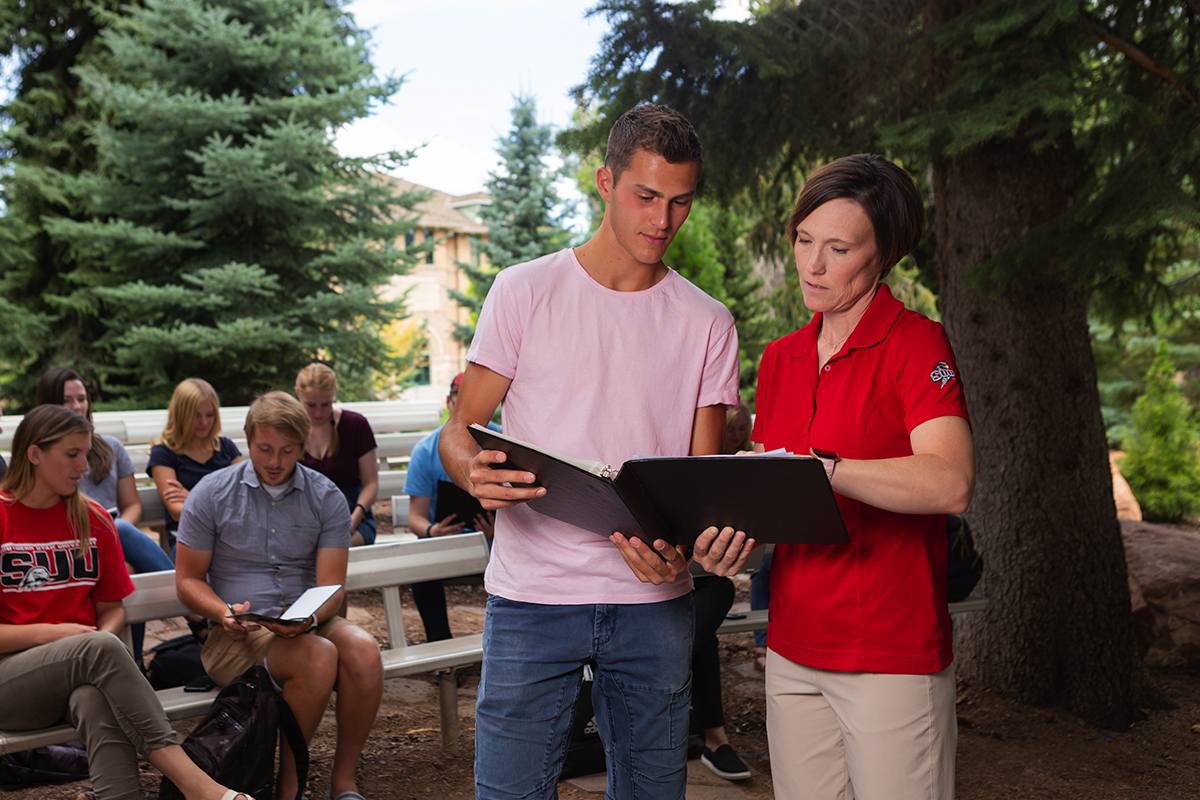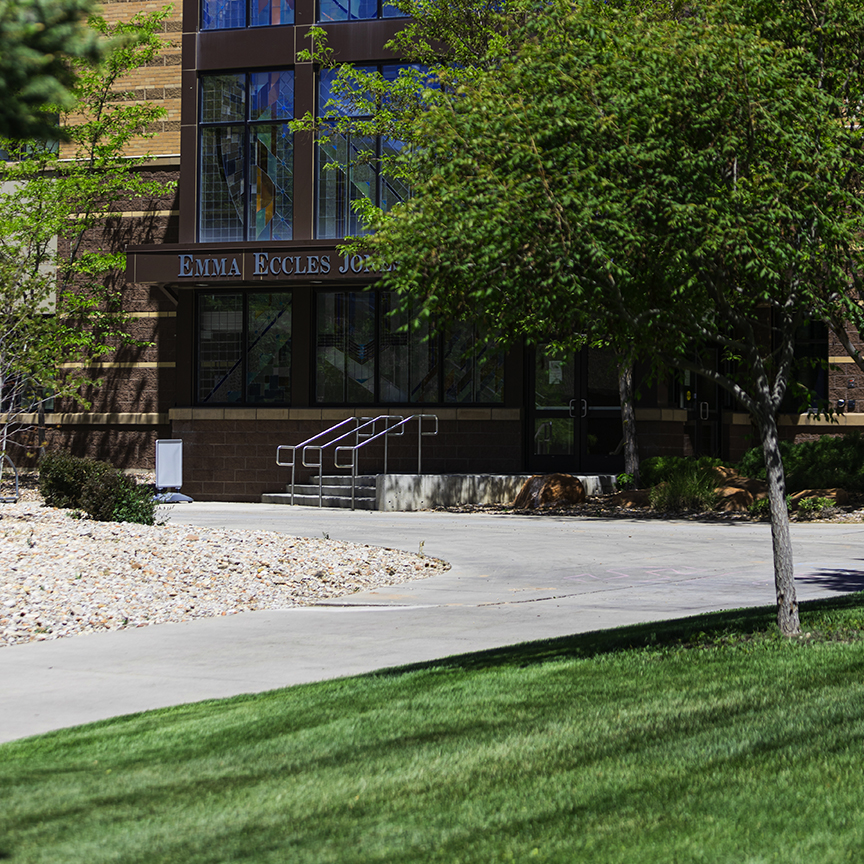Master’s of Education in Special Education

Our comprehensive program prepares students to effectively meet the needs of youth with disabilities in school settings by earning a fully online Master’s of Education in Special Education degree at Southern Utah University. Students will be well-prepared to provide direct special education services in schools while pursuing their own unique interests and goals through your research focus. All of this can be accomplished on a flexible schedule that accommodates your busy lifestyle.
Program Overview
The Master of Education in Special Education is designed to prepare high-quality special educators to teach students who have mild to moderate disabilities in grades K-12. Students successfully completing this degree program will receive a Master of Education and, if necessary, a Utah professional teaching license in mild/moderate disabilities for grades K-12. Licensed teachers, administrators, and other school professionals, as well as teachers who are seeking alternate routes to licensure, are encouraged to apply.
In order to earn an initial Utah professional teaching license in mild/moderate disabilities, students must either:
- Hold a current elementary or secondary Utah teaching license
- Be enrolled in the APPEL-SPED program through Utah State Board of Education.
*Initial Utah professional teaching licenses can not be earned through this program.
Core special education courses fulfill all competency requirements of Utah’s Board Rule R-277-304-7 for special education teacher preparation programs. Students will learn evidence-based practices for teaching students with disabilities through rigorous coursework, practical classroom application, and collaboration with peers and instructors.
- Learn to design, adapt, and deliver instruction to address each student’s diverse learning strengths and needs.
- Understand compliance with federal and state laws as they relate to the provision of special education.
- Support learning of all students through the establishment of a positive learning climate that values multiple experiences, diversity, and respectful interactions.
- Demonstrate collaboration and shared responsibility for decision-making with other school professionals to plan and jointly facilitate learning to meet diverse needs of students.
- Researches, designs, and implements developmentally appropriate and challenging learning experiences in collaboration with families, colleagues, and students.
- Develops professional autonomy and advocates for students, schools, communities, and teaching.
Core Special Education Requirements (21 Credits)
SPED 6100 - Programming and Management 3 Credit(s)
This course provides an overview of the service patterns, management needs, organizational variables, and instructional models necessary for success with students with mild/moderate disabilities.
SPED 6110 - History and Law 3 Credit(s)
This course reviews the role of federal, state, and local governments in special education issues with an emphasis on case and regulatory law. Focus will be placed on how the IDEA impacts education.
SPED 6120 - Creating and Managing a Learning Environment 3 Credit(s)
This course helps students understand how to create effective learning environments by establishing and implementing routines and procedures with consistent expectations. Students will learn how to implement personalized learning practices that consider the whole child, including function-based thinking, implementing least restrictive behavioral interventions, trauma-informed instructional practices, and restorative instructional practices.
SPED 6130 - Intervention Strategies in ELA for Students with Disabilities 3 Credit(s)
This course provides students with a comprehensive overview of the curricular and instructional needs of students with mild/moderate disabilities in the areas of reading and writing.
SPED 6145 - Assistive Technology, Collaboration, and Post-Secondary Transition 3 Credit(s)
This course reviews collaboration and communication skills necessary for special educators to conduct transition planning for a continuum of students with mild/moderate disabilities. Students will also gain the requisite knowledge in providing assistive technology support.
SPED 6160 - Assessment for Learning and Data-Driven Decisions for Special Education 3 Credit(s)
The focus of this course includes: Planning instruction and assessment in content-specific teams and in cross-curricular teams. Designing, administering, and reviewing educational assessments in a meaningful and ethical manner; formative and summative assessments results to inform and modify instruction; assessing students for competency for the purpose of personalized learning. Integrating technology to support and meaningfully supplement the learning of students, including the effective use of software for personalized learning. Knowledge of the Utah Educator Professional Standards (UETS); knowledge and skills in collaborating with parents and guardians; skills in providing tier one and tier two instruction and intervention on the Utah Core Standards and positive behavior supports to each student within a multi-tiered system of supports. Includes School Practicum.
SPED 6170 - Intervention Strategies in Math for Students with Disabilities 3 Credit(s)
Students will learn and practice evidence-based methods for teaching math. The course will focus on elementary through upper middle school math standards.
Capstone Requirements (9 Credits)
EDUC 6030 - Principles of Practitioner Research 3 Credit(s)
The study of current psychological principles of teaching and learning as they apply to positivist and constructivist research paradigms. Principles and techniques for studying one’s professional practice. The use of educational measures for evaluation and planning processes.
EDUC 6650 - Practitioner Research I 3 Credit(s)
This course builds upon the practitioner research proposal begun in EDUC 6030: Principles of Practitioner Research by applying action research tools to classroom study. Candidates finalize research questions, conduct a literature review, determine their research methodology, and obtain IRB approval.
EDUC 6933 - Practitioner Research II 3 Credit(s)
Student completes and presents a Practitioner Research Thesis based upon a previously selected topic and question. Advisor approval required and advisor will complete registration.
Electives (0-6 Credits)
- SUU undergraduate students who have already taken SPED 6120 and/or SPED 6160 at the undergraduate level will select 3 or 6 credits of electives in place of those courses.
- May be selected from graduate-level endorsement courses or from other SUU graduate programs with approval of the M.Ed. Program Director.
*Please note that some students may ultimately earn more credits than listed above for the master’s degree. If the capstone cannot be completed within one (1) semester, students must be enrolled continuously in EDUC 6931 - Capstone Master of Education Seminar until completion.



